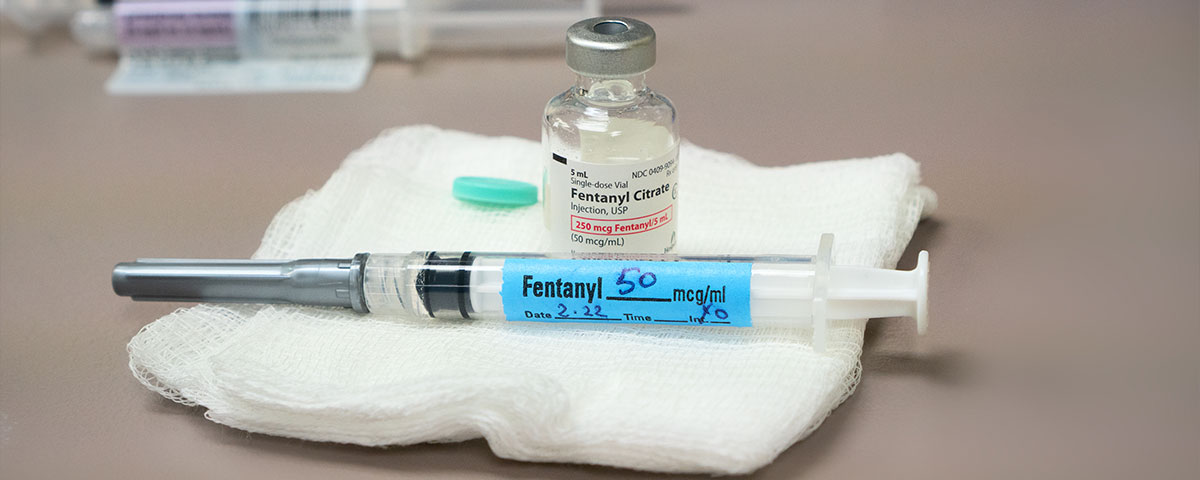Difference Between Carfentanil and Fentanyl
Opioid addiction has been a growing problem in the United States since the start of the opioid epidemic in the late 90s. Millions of Americans have struggled with an addiction to opioids as a result of excessive prescriptions and lack of regulations. Although much has been done to tackle this problem, many individuals are still struggling to quit their use of synthetic opioids like fentanyl and carfentanil. As a drug rehab facility in Delaware, we know that people often mix up these two drugs despite their distinctions. We’re sharing more about the difference between carfentanil and fentanyl as well as their side effects.
What is Carfentanil and What Does it Look Like?
Carfentanil is a synthetic opioid analgesic that was first made in 1974 with the intention to use it as a tranquilizer for large animals, such as elephants or horses. It only takes about 10mg of carfentanil to sedate a large animal, which may give you an idea of how potent it is. Carfentanil works like any other opioid, by binding to the opioid receptors in the body and promoting the release of chemicals like dopamine. It’s the rush of euphoria caused by the release of these chemicals that hooks users. Carfentanil is not prescribed to people in any way and is not made for human consumption. It’s 10,000 times more powerful than morphine and 100 times more powerful than fentanyl, making it highly addictive and dangerous.
Carfentanil is colorless and odorless when in liquid form, but it can come in the form of a pale yellow or white powder. It can be injected, smoked, snorted, or absorbed into the skin. Although it produces similar side effects to other opioids, such as euphoria, sedation, and dizziness, another side effect is respiratory depression. Due to its potency, one of the most common side effects of carfentanil in people is overdose, which can cause respiratory depression and death. Even a small 2 mg carfentanil dosage can be deadly to a person. This drug can be purchased online or on the streets and is often used as a cutting agent in other drugs like heroin and fentanyl when sold on the streets, increasing the risks of overdose and other complications.
We offer a medically monitored detox at Banyan Treatment Centers Delaware for drugs like opioids to help individuals with severe addictions safely get through the withdrawal phase. We know that many people are hesitant to begin the addiction recovery process because of the discomforts of withdrawals. Our medical detox offers a comfortable environment where patients receive 24-hour supervision and medical care to safely detox from drugs.
What is Fentanyl and What Does it Do?
Fentanyl is also a synthetic opioid analgesic that is 50 to 100 times more potent than morphine. It’s a Schedule II prescription drug that is normally used to treat severe pain or pain following surgery. Some common prescription forms of fentanyl include medications like Actiq, Duragesic, and Sublimaze. However, fentanyl is also made and sold illegally. It can be injected, absorbed through the skin, or ingested through lozenges. Fentanyl works just like any other opioid by attaching to opioid receptors and inciting the release of neurotransmitters like dopamine and serotonin. It’s often made in labs and is sold on the streets in the form of a powder, liquid absorbed by blotter paper, liquid in eye droppers and nasal sprays, and pills.
It’s also common for drug dealers to put fentanyl in other drugs like heroin, cocaine, MDMA (ecstasy), and methamphetamine. People who purchase these drugs on the streets are often unaware of their ingredients and the possible dangerous drug interactions that can occur. Adding fentanyl to other drugs increases the severity of its side effects.
Some common side effects of fentanyl include:
- Euphoria or extreme happiness
- Drowsiness
- Nausea and vomiting
- Confusion
- Constipation
- Sedation
- Trouble breathing
- Unconsciousness
Fentanyl is a highly addictive drug that can cause a variety of health issues if abused long-term. People who abuse fentanyl frequently usually require professional treatment to help them quit. Our opioid addiction treatment at Banyan Delaware helps people addicted to opioids like carfentanil and fentanyl regain their health and sobriety.
What’s the Difference Between Carfentanil and Fentanyl?
The main difference between fentanyl and carfentanil is their potency and what they’re used for. Fentanyl is 50 to 100 times more potent than morphine, but carfentanil is 10,000 times more powerful than morphine. This means that a smaller dose of carfentanil can cause similar or even more powerful side effects. It also means that a person is more likely to overdose on a smaller amount of carfentanil than fentanyl. Another difference between carfentanil and fentanyl is what they’re used for. Fentanyl is a prescription drug given to people to treat severe pain, whereas carfentanil is not intended for human consumption and is only used by veterinarians to sedate large animals.
How Are They Similar?
Of course, carfentanil and fentanyl also share several similarities, including:
- Both are synthetic opioid analgesics
- Both produce similar side effects (although people are more likely to overdose on carfentanil before experiencing a high)
- Both can cause overdose, which is marked by symptoms like respiratory depression and sometimes death
- Both are more potent than morphine
- Both are used as cutting agents in other drugs
- Both can be injected, snorted, absorbed into the skin, smoked, or ingested in a pill
- Both are made illegally and sold illegally on the internet and the streets
- Both are extremely addictive
Addiction to any opioid is a serious problem and should be treated. A substance use disorder can destroy your health, relationships, and finances. Our rehab offers various addiction levels of care in Milford that include substance-specific treatments and therapy programs that can help. Call us now at 888-280-4763 to learn more from one of our team members.
Related Readings:









